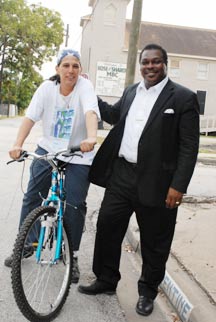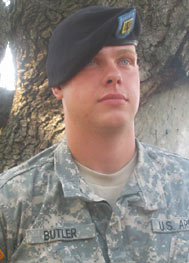Posted: 11/10/06
|
| Pastor Elmo Johnson of Rose of Sharon Baptist Church in Houston secured partnerships with Texas Southern University and Rice University to provide tutors for these students. |
Inner-city Houston churches
seek community transformation
By Barbara Bedrick
Texas Baptist Communications
HOUSTON—Some people view Elmo Johnson as a mover and a shaker—an entrepreneur for God who is leading his church to transform lives for God in the inner city.
Johnson, a former Houston Baptist University baseball player, is pastor of Rose of Sharon Baptist Church. He sees himself as a faithful member of God’s team, and he faces far more pressure on this playing field than on any baseball diamond where he competed, because now he’s competing for lives.
| See a slideshow of Johnson's ministry here. |
“We’ve buried a lot of kids in this neighborhood,” Johnson said. “We buried 20 kids one year. We had 20 funerals for young people here in the Fourth Ward.
“Kids are killing kids here. One kid was shot to death because he beat another neighborhood boy to a drug dealer’s car to purchase illegal substances.”
Two other boys reportedly doing drugs stole a car, then ran from police and hit a tree. One died instantly; the other swallowed his drugs and died later.
Several inner-city ministries, including Macedonia Baptist Church, Friendship Baptist Church, Bible Way Baptist Church, Antioch Baptist Church, West University Baptist Church and Rose of Sharon Baptist Church formed a coalition to turn the community around.
But the mission particularly is important to Johnson and Rose of Sharon.
The 67-year-old church sits squarely in the shadow of downtown Houston and less than a block away from Founder’s Cemetery, where the city’s forefathers, the Allen Brothers, are buried. The community commonly known as Fourth Ward originally was known as Freedmen’s Town, given by freed slaves who settled it.
Once a desolate, dirty and destructive neighborhood in the inner city, the city’s oldest African-American community is developing into a sanctuary for God’s work. But it took many deadly confrontations to spur the revolution.
 |
| Elmo Johnson talks with a neighborhood resident outside his church in Houston's Fourth Ward. |
“One time, a kid got shot on the street, and I couldn’t sleep anymore,” Johnson said, with tears in his eyes. “I prayed to God. He said to me, ‘Get out of these four walls and into the community.’”
These days, Johnson seldom meets a stranger in the neighborhood. Practically everyone knows him—particularly the first-time homeowners who benefited from a partnership he developed.
Johnson brought together the city government, real estate developers and federal agencies to build affordable housing in the Fourth Ward. The homes were made available at low-interest rates to residents who never realistically expected to own a home.
“I’ve been blessed,” said Diane Garza, a Fourth Ward resident. “This is the best thing that ever happened to me.”
With Johnson’s help, Garza now owns her own home—a three-bedroom, two-bath house with a two-car garage. She can enjoy riding bikes through the neighborhood safely.
Down the street, another church neighbor claims he would not be celebrating his own home today without Johnson’s assistance.
The 30-member congregation is extending its faith beyond the church walls. Top priorities are taking care of the senior citizens, young adults and young girls and boys on the street.
“We still lost eight kids this year. We buried eight kids,” said Johnson with frustration in his voice. But in a community where drugs and danger walk hand in hand, Johnson has not only prayed for a miracle, he has seen one.
“The makeup of the community is changing,” Johnson explained. “Where weeds and illegal activity once reigned, we now have gates and eight-foot fences.”
Where weeds once stood, a new three-story senior citizens’ apartment complex is rising across the street from Rose of Sharon. After losing her home to new development, an elderly woman is happy again after Johnson worked to ensure there would be an apartment building constructed just for senior citizens. That woman now sits on the porch of a nice new homae—reciting poems and visiting with neighbors.
Cementing partnerships and relationships, Johnson keeps on working. Recently, Trammell Crow and a group of its volunteers called “Elmo’s Army” also constructed 100 new apartment homes for area families. Now, one of the church’s more critical goals is to reach the young people through education. This month, Rose of Sharon Baptist Church announced its partnership with the nearby Gregory Lincoln Learning Center, a Houston Independent School District middle school of nearly 700 students.
The church’s 53-year-old pastor secured partnerships with Rice, Texas Southern University, University of Houston, Lakeland Baptist Church and Deer Park Baptist Church to provide tutors for the students.
“We want to give these kids an alternative to selling drugs and stealing,” Johnson said. “We want to ensure that no kid will drop out of K through 12.”
The adopt-a-school program is a move to teach young people trades such as plumbing, roofing and electrical work to keep them from a life of crime. Students first must commit not to sell drugs. They also must commit to get a high school diploma or a GED and to get life-skills training.
Recently, Rose of Sharon purchased $2,000 worth of school uniforms and shoes for 100 kids, other clothes, 25 backpacks, food and toys.
Pastor of Rose of Sharon for 22 years, Johnson is excited about the wonders God is working. Church members have refurbished and painted a little red schoolhouse called the Georgia Woods Learning Center. Inside, parents and children will have the opportunity to take classes to improve their literacy.
Deacon Willie Scott, a former drug addict and an ex-convict, returned to the Fourth Ward and started From Jails to Jobs to help others like himself develop skills to keep them out of trouble.
But Johnson is quick to note Rose of Sharon Baptist Church is not alone in its efforts. Other churches in the inner city also are doing their part to help spread the gospel and save lives.
“The Lord has been kind,” noted Johnson. “We think he’s making a difference through us, and it will give the families here new hope and new lives.”
News of religion, faith, missions, Bible study and Christian ministry among Texas Baptist churches, in the BGCT, the Southern Baptist Convention ( SBC ) and around the world.




